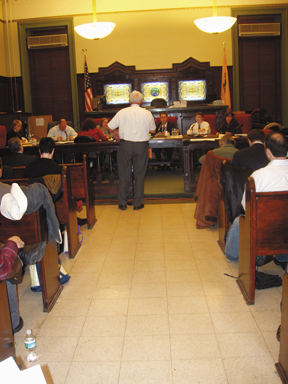For the past decade, the mantra of Hoboken has been build, build, build. But now, as the city prepares to pick the next mayor, the City Council is putting the brakes on development. Several redevelopment plans to rebuild blighted areas near the city’s borders were put on hold last week.
The City Council tabled a few important measures on Wednesday night that would have forwarded redevelopment processes, and at least one council person asked for a redevelopment moratorium until a new mayor is elected in May.
A proposed NJ Transit Redevelopment Plan at the city’s southern border is in limbo for several reasons. Also, scrutiny of the Western Edge Redevelopment Plan is becoming more intense as the plan inches closer to fruition. And a new redevelopment study for an uptown section of Hoboken to be developed by the Rockefeller Group was first adjusted to include more land, and now is being halted because the council can’t agree on a clear objective.
“I think all redevelopment projects should be tabled,” Councilman Peter Cunningham recommended on Wednesday, adding they should wait until the May 12 mayor and council election is over. He said approval for these permanent additions to the city is many times rushed to include the associated revenues into city budgets.
“We shouldn’t be using redevelopment to solve our fiscal problems, because we see where that has gotten us,” he said.
The council tabled measures for the NJ Transit, Western Edge, and Northwest redevelopment areas.
Public trying to stay involved
Many members of the public who showed up at the meeting to speak on redevelopment were disappointed to find out that most of the measures had been removed from the agenda or tabled.
Resident Keith Furman said the council should let the public know ahead of time if a measure is going to be tabled or removed.
All of the deals would increase tax revenue to the city by allowing taxpaying properties to be built on cleaned-up land. The city could also ask for givebacks or specific amenities from the developer, like a park. However, the influx of new residents would demand an increase in services provided by the city.
Resident Michael Peerless pointed out at the meeting that building more and more residential units can exasperate that problem. He said that according to reports, for every dollar in taxes the city takes in from residential development, it provides $1.15 to $1.50 in services.
On the other hand, he said, for every dollar taken in taxes for commercial development, the city only provides roughly 65 cents in services.
His conclusion was that the city could increase taxes collected without an increased demand for services, if they focused more on commerce and retail.
After approving the city’s $123.8 million budget at a previous meeting, the Hoboken City Council voted – merely as a formality – to send it to the state Local Finance Board for approval last Wednesday.
But later in the meeting, they voted on a measure related to the budget. This measure would allow the city to postpone certain pension payments to the state this year, and start paying in the future instead. This was made possible by a recent bill in the state legislature.
“You just blew up the budget.” – Steven Kleinman
________
Councilpersons Beth Mason, Michael Russo, and Dawn Zimmer voted against the delayed payment. With three councilpersons not present, the measure failed to get a majority vote.
Councilpersons Theresa Castellano and Ruben Ramos were absent, and Councilman Peter Cunningham was running late to the meeting.
Mason spoke against stringing out the costs into future budgets. “We’re going to eventually have to pay this off,” she said.
Russo and Zimmer agreed.
But after requests from the administration to reconsider the vote, Michael Russo obliged.
“I’m torn on this one,” he said. But he changed his vote in order to “get the budget down to the [Department of Community Affairs]” for state approval.
Other items
The council passed a few other measures at the meeting. One resolution authorized the city to apply for a federal grant to save police officers in danger of being laid off. According to sources, the layoff plan sent by the city to the state for approval was most likely filed with this grant application in mind. If their application is approved, the city could use grant money to keep police in their position.
Another resolution appointed the city’s engineering firm, Remington & Vernick, with the title of Principal Public Works Manager, although the title does not come with any stipend or pay increase. The firm voluntarily took on the task while newly appointed Director of Environmental Services Jim Ronga seeks certification for the title.
The council also adopted a “multi-jurisdictional pre-disaster mitigation” plan that, by adopting, Zimmer said would make Hoboken eligible for grant funding for disaster planning.
A resolution was proffered by Zimmer to require developers seeking tax abatements to include a comparative analysis of similar properties. It was tabled because Zimmer could not get someone from the council to second the resolution. When Cunningham later arrived and agreed to second the measure, Zimmer was rebuffed by council president Nino Giacchi.
Giacchi said that it would be disingenuous of her to go back on her agreement to table the resolution, but Zimmer made a point that the council was allowed – if need be – to draft resolutions right at the dais.
Giacchi agreed, but noted that the measure had not officially passed through committee, a stipulation that Zimmer herself has championed in the past. – TJC
Timothy J. Carroll may be reached at tcarroll@hudsonreporter.com.
